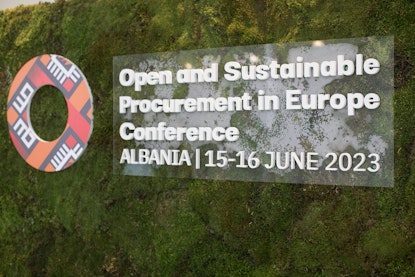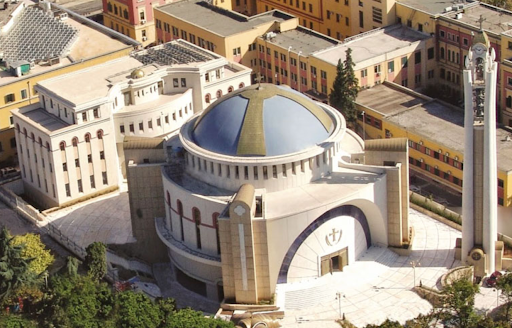Open Procurement in Europe: 100 experts share their vision for the future

Public procurement can shape our world. On 15-16 June, together with the governments of Albania, Italy and the Netherlands, we held a conference on Open and Sustainable Procurement in Europe for about 100 procurement leaders from 25 European countries. This was also the first procurement conference I have ever seen taking place in a church complex – the Resurrection Orthodox Cathedral of Tirana – giving it a very special feel with it’s circular lines inspiring community!

Key takeaways
1. An exciting and knowledgeable open and sustainable procurement community is taking shape. Inclusion, sustainability and digitization shouldn’t be planned in silos but planned for together.
For example, Lisbon city’s adviser Gonçalo Negrão Serra emphasized the role of cities in shaping the market through sustainable and socially conscious procurement practices, implementing a strategic plan, and seeking collaboration with other cities. Felix Zimmermann from the German government shared how Germany is integrating sustainability and inclusion into its practices through a monthly roadmap for ICT procurement, training programs for vendors, digitization, and improving data management, including publishing open contracting data through the Bekanntmachungsservice ÖffentlicheVergabe.de. Lucien Claassen, ICT Category Manager in the Netherlands, shared the government’s ambitious goals, including climate neutrality by 2030 and complete circularity by 2050. They track their progress through lifecycle analysis and sustainability scores of both vendors and products. Lithuania aims at 100% green procurement by the end of 2023, and data and technology are at the center of their effort, said Kestutis Kazulis, Principal Advisor on sustainable public procurement (SPP) at the Lithuanian Public Procurement Office. The Deputy Minister of Lithuania, Erika Kuročkina, warned about the dangers to competition during the green transition. Giuseppe Busia, President of Italy’s National Anti-Corruption Authority (ANAC) highlighted digitalization as a key element to prevent corruption and improve efficiency in public procurement and provided concrete examples of how ANAC collaborates with civil society to pursue data-driven approaches to anti-corruption. There were many, many more great examples to share. Look out for resources and blogs coming out in the coming months and let us know if you’d like to share your experience with the open contracting community..
2. Open government and open contracting approaches can make a real difference in making procurement sustainable.
Denmark alone, for example, experienced a 12% increase in CO2 emissions from 2019 to 2021, attributed to public procurement. This highlights the need for a European strategy to encourage the market to respond to the demand for green and sustainable products.
Fortunately, there are multiple emerging projects in Lithuania, Poland, Italy and elsewhere on attaching a strong open government element to sustainability transition. However, these types of projects are not yet the default, so this community is a good platform for cross-learning. We will continue to promote knowledge exchange as we strongly believe in the role of technology and citizen engagement in sustainable transition. A good place to start is our Open and Sustainable Procurement Toolkit that provides public procurement reformers and practitioners with practical insights for their day-to-day needs in making procurement sustainable – and where we’ve highlighted short case studies from the region.
3. There is a consensus among stakeholders that the European Commission has a good vision for a robust procurement data architecture in the EU and that this is an opportunity to drive the radical change that is needed. National implementers engaged eagerly in discussions with the European Commission with a genuine will to help it succeed with some of its landmark reforms, including eForms and the Public Procurement Data Space (PPDS).
Ciprian Cristea, Head of Unit responsible for both reforms, laid out plans to put all available EU procurement data in the PPDS and how it will make it possible to create insights to help track policy goals, improve transparency and integrity, value for money, and reduce red tape.
The member states we’ve heard from are also collecting data on additional non-mandatory fields to help them better track these policy goals. We’re also encouraged to see that many are collecting below-threshold procedures, for example, through a simplified eForm.
Many agreed that the missing piece is making public procurement a High-Value Dataset under the Open Data Directive, which would mandate all EU countries to publish their procurement data as open data. In our efforts to help the Commission measure up, we just published a EU Procurement Data Transparency study that shows how much procurement data is published and how open it is across 27 EU countries. We will continue working to make sure public procurement is recognized as a High-Value Dataset under the Directive in the next year.
4. Lastly, individual champions play a massive role in open contracting progress. The conference was once again a demonstration of the power of one. In May 2022, during the closing of our first gathering in Amsterdam, the Chair of Albania’s Public Procurement Commission, Jonaid Myzyri raised his hand and committed to hosting the second edition of the conference in Tirana. He’s also been the driving force behind reforms to build an e-complaint system making a critical area of the public procurement process fairer and more transparent. We know how much work he and his team have put into it, and they delivered big time. This encourages us to celebrate and support our global leaders, and to continue supporting individuals and teams through our Lift impact accelerator.
Next steps
We hoped to be able to develop a shared vision, exchange best practices, and build a community of action when we designed the conference. And we’re excited to see that we’ve achieved this.
With more than 40 speakers over 15 sessions, the conference only scratched the surface of the needs and power of the community. We’ve seen a tremendous demand for more collaboration in the space, among government agencies and across different stakeholders including technical experts, civil society organizations, and regional organizations. The power to change and kick off reforms can come from anyone, large or small, government or NGOs. So, we were excited to count on more than 25 governments and organizations like the European Bank for Reconstruction and Development, Asia Development Bank, Mastercard, European Climate Foundation, and International Institute for Sustainable Development who joined the conversation. We have to respond to this call from governments and other stakeholders for cross-learning and collaboration in Europe. Open Contracting Partnership is well positioned to help the European open and sustainable contracting community grow into a coordinated learning movement, and we already have plans for how to do it.
We will continue documenting case studies and insights from across the region, create a permanent sharing group on one of the social media networks and follow up with community-building activities. Stay tuned.
Check out photos from the event and sign up to our Europe-specific newsletter here.